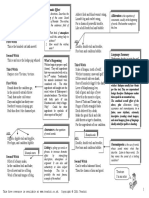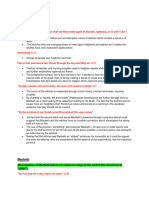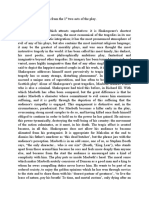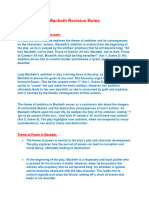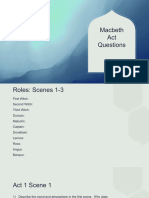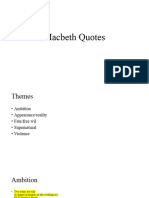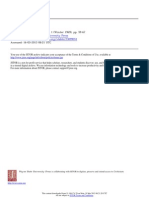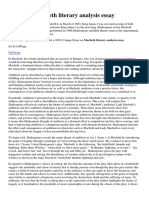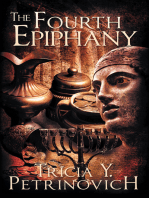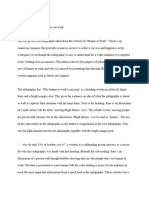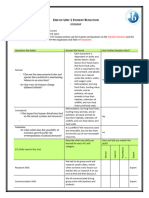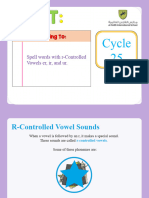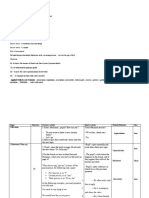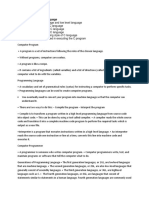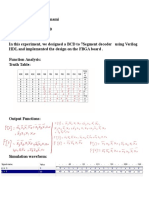Repetition
Uploaded by
mmoghrabi.hananRepetition
Uploaded by
mmoghrabi.hananRepetition:
Definition:
Repetition is a fundamental poetry device that refers to the use of the same word or phrase
repeatedly.
Example: Witch Witch
Witch, witch, where do you fly?
Under the clouds and over the sky.
Witch, witch, what do you eat?
Little black apples from down the street.
Witch, witch, what do you drink?
Vinegar and runny red ink.
Witch, witch, where do you sleep?
Up in the clouds where the pillows are cheap.
Evidence in The Tragedy of Macbeth:
Act 1 Scene 7 Page 13
LADY MACBETH: Then what kind of beast were you when you first told me about all this?
When you dared to do it, that’s when you were a man. And to actually do it in order to become
king, then you’ll be that much more of a man. The time and place weren’t right before—but you
would have done it anyway. Now the time and place are perfect, but it's as if their very
perfectness unnerves you. I have breastfed a baby, and I know how sweet it is to love a nursing
baby. But even as the baby was smiling up at me, I would have yanked my milk from its mouth
and dashed out its brains if I had sworn to do it in the same way you have sworn to do this.
Act 1 Scene 3 Page 5&6
FIRST WITCH: All hail, Macbeth! Hail to you, Thane of Glamis!
SECOND WITCH: All hail, Macbeth! Hail to you, Thane of Cawdor!
THIRD WITCH: All hail, Macbeth, who will be king in the future!
FIRST WITCH: Hail!
SECOND WITCH: Hail!
THIRD WITCH: Hail!
Effects of it and why Shakespeare uses it:
Repetition shows the importance of this phrase or words, it can make it more intense, or make
the reader focus and notice it. Shakespeare uses repetition to grab the readers attention and make
them notice what he (Shakespeare) wants us to focus on.
Dramatic Irony:
Definition:
Dramatic irony is a literary device that was first applied in Greek tragedy and allows the reader
or audience to understand the full significance of a character's words or actions even while the
character is unaware of it.
Example:
Dramatic irony can be seen, for instance, in a Titanic movie when a character leans on the
balcony just before the ship strikes the iceberg and remarks, "It's so beautiful I could simply die."
When the audience is aware of information that the characters are unaware of, dramatic irony
results.
Evidence in The Tragedy of Macbeth:
Act 1 Scene 4 Page 8
DUNCAN [To MACBETH]: My noble cousin! I’ve just been feeling guilty for not showing you enough
gratitude. You’ve accomplished so much that, no matter how fast I try to reward you, I haven’t been
able to give you enough. If you deserved less, then perhaps the balance between what I can reward and
what you deserve could be tipped in my favor. But all I have left to say is that I owe you more than I can
ever repay.
MACBETH: The loyalty I feel to you and the chance to serve you is its own reward. Your Highness’s duty
is to accept our loyalty and service, while our duty to your kingship and country is similar to that owed
by children to their father or servants to their master: we’re only doing what we should when we do all
we can to protect you.
Here, we see how Macbeth is telling Duncan about how loyal he is and how honored he is to
serve him, and protect him. When we (the audience) know very well that Macbeth is actually
planning on assassinating King Duncan making him betray the king.
You might also like
- The Concept of Power is Fickle in That It is Often Weaponised by Those of Ill IntentNo ratings yetThe Concept of Power is Fickle in That It is Often Weaponised by Those of Ill Intent2 pages
- Impression of Macbeth From The 1st Two Acts of The PlayNo ratings yetImpression of Macbeth From The 1st Two Acts of The Play4 pages
- Macbeth a+ Student Essay the Significance of Equivocation in Macbeth SparkNotesNo ratings yetMacbeth a+ Student Essay the Significance of Equivocation in Macbeth SparkNotes1 page
- Double Toil and Trouble. Fire Burn and Cauldron Bubble.' (4.1.130) The Use of The Word Double ConnotesNo ratings yetDouble Toil and Trouble. Fire Burn and Cauldron Bubble.' (4.1.130) The Use of The Word Double Connotes3 pages
- Fair Is Foul, Foul Is Fair, Hover Through The Fog and Filthy Air.No ratings yetFair Is Foul, Foul Is Fair, Hover Through The Fog and Filthy Air.4 pages
- Macbeth literary techniques act1, scene 1,2,3,4No ratings yetMacbeth literary techniques act1, scene 1,2,3,43 pages
- How Does Act 1, Scene 3 Present The Changing Character of Macbeth?'No ratings yetHow Does Act 1, Scene 3 Present The Changing Character of Macbeth?'2 pages
- BA2 (H) English (Lust For Power in Macbeth)No ratings yetBA2 (H) English (Lust For Power in Macbeth)11 pages
- English Coursework - Macbeth: How Is Evil Presented in Macbeth?No ratings yetEnglish Coursework - Macbeth: How Is Evil Presented in Macbeth?4 pages
- Year5 - Summative - Unti1 - App Design - DNo ratings yetYear5 - Summative - Unti1 - App Design - D2 pages
- Practice Set 2-Written Expression: Example INo ratings yetPractice Set 2-Written Expression: Example I2 pages
- It's Delicious ! Didactic Project 02.03.2020No ratings yetIt's Delicious ! Didactic Project 02.03.20204 pages
- Feminist, Historical and Reader-ResponseNo ratings yetFeminist, Historical and Reader-Response2 pages
- Guidelines On The Use of Gender-Fair Language in The Judiciary and Gender-Fair Courtroom EtiquetteNo ratings yetGuidelines On The Use of Gender-Fair Language in The Judiciary and Gender-Fair Courtroom Etiquette27 pages

